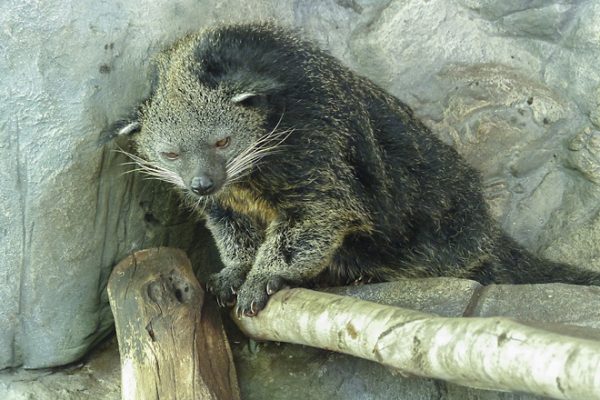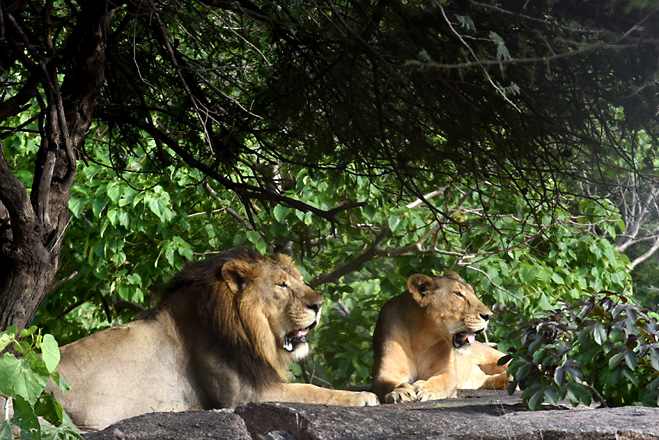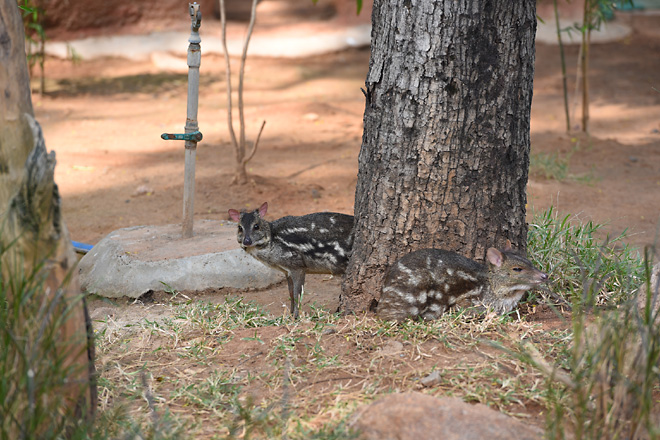
Blood samples of bearcat were collected from Sepahijala Zoo in Tripura for DNA analysis
By | Published: 3rd Dec 2019 1:10 am
Hyderabad:
Researchers from Centre for Cellular and Molecular Biology
(CCMB)-Laboratory for Conservation of Endangered Species (LaCONES) have
completed the genome analysis of the highly vulnerable Indian species of
bear cats, also known as binturong.This is for the first time that researchers have concluded the genome sequencing of a wild-caught binturong of known provenance belonging to the Indian subspecies Arctictis binturong albifrons, using Next-Generation Sequencing (NGS) methods.
The genome sequencing work on bearcats by CCMB-LaCONES was published in the ‘PeerJ-Journal of Life and Environment’ this November and was led by LaCONES senior scientist, Ajay Gaur and funded by Council for Scientific and Industrial Research (CSIR).
Bearcats or binturongs are unique because of their cat like face, a bear like small body and a tail that is almost similar to a monkey. They inhabit in the rain forests of NorthEast India and are characterised by coarse, black fur and a prehensile tail.
The blood samples of the bearcat were collected from Sepahijala Zoo in Tripura for DNA analysis and also deposited in the Genome Bank at the Laboratory for Conservation of Endangered Species (LaCONES), CCMB.
Genome sequencing of the entire DNA which is the process of determining the complete DNA sequence of an organism’s genome, will eventually help in conservation. In the last three-decades, according to conservationists and animal welfare activists, there has been a 30 per cent decline in bearcat population.
Researchers said that the bearcat was known as a keystone species in the rain forest ecosystem because of its special relationship with fig trees. Being a species that fully subsist on fruits, the animal facilitates and propagates seed germination while fig tree provides a stable dietary source to the animal.
According to the LaCONES study, there were nine subspecies of bearcat spread across Southern and SouthEast Asia. ‘Further molecular studies are required to test the distinctiveness and diversity of the nine putative subspecies of binturong,” the LaCONES study said.
Binturongs are presently being poached for their meat, traditional medicines and the pet trade, and alongside habitat destruction, these factors have contributed to decreasing the numbers of binturong to a few geographical pockets across the species’ former range. As a result of these increasing pressures, the binturong is listed as ‘Vulnerable’ on the IUCN Red List of Threatened Species, the study said.
Achievements of CCMB-LaCONES
Asiatic Lions
The researchers at CCMB-LaCONES led by Ajay Gaur took-up study of genetics and population structure and evolutionary history of the Asiatic lions in the Gir forests in India. The study was taken up because the entire wild population of the lions are confined to a single location, as a result the Asiatic lion is facing an increased risk of extinction because of very low numbers and continuous inbreeding. The CCMB-LaCONES reported the first draft of the whole genome assembly of male Asiatic lion.
Stress levels on Indian tigers
The CCMB-LaCONES researchers led by G Umapathy also conducted study on tiger, the critically endangered species. The researchers studies the physiological stress response of tigers due to disturbance such as encounter rates from livestock and humans etc in three tiger reserves including Sariska, Bandhagarh and Kanha. Studies found that stress levels among tigers were high during tourism period and low during non-tourism period.Indian Mouse Deer
The researchers at LaCONES collaborated with the conservation experts in Nehru Zoological Park for conservation breeding and reintroduction of Indian Mouse Deer in Telangana. The captive mouse deer population by the end of October 2019 increased to 173 animals. The release of the mouse deer was done in Amrabad tiger reserve, Kinnerasani wildlife sanctuary and Mrugavani National Park.
Now you can get handpicked stories from Telangana Today on WhatsApp / Telegram everyday. Click these links to subscribe and save this number 9182563636 on your contacts.
https://telanganatoday.com/ccmb-completes-genome-analysis-of-vulnerable-bear-cats

No comments:
Post a Comment